#Small Soldiers 1998
Explore tagged Tumblr posts
Text
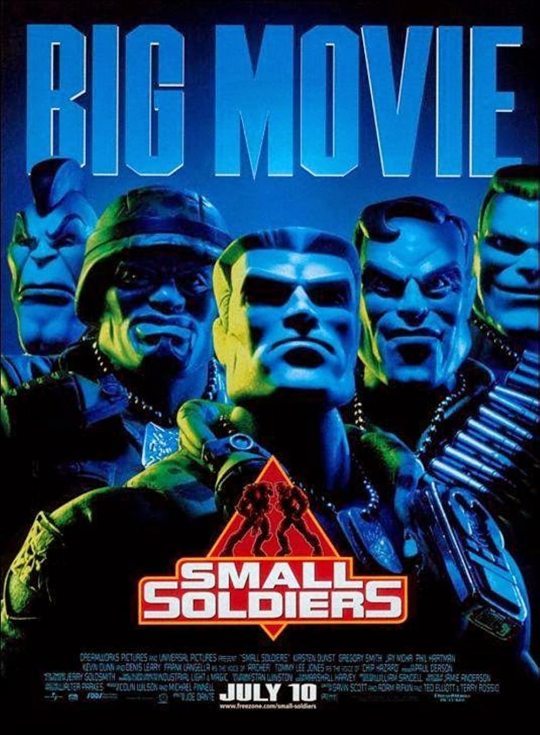
"Soldiers, no poor sap ever won a war by dying for his country. He won it by being all that he can be. Damn the torpedoes, or give me death! Eternal vigilance is the price of duty. And, to the victors go the spoils. So remember: you are the best of the best of the few and the proud. So ask not what your country can do for you, only regret that you have but one life to live! The war against the Gorgonites will be won! Commando Elite, let the first shot be fired! Search out the Gorgonites and frag 'em all!"
Happy 25th Anniversary to Small Soldiers
July 10th 1998-July 10th 2023
#Small Soldiers#Small Soldiers 1998#Chip Hazard#Archer#Tommy Lee Jones#Kirsten Dunst#Gregory Smith#Phil Hartman#Frank Langella#Joe Dante
61 notes
·
View notes
Text










Small Soldiers (1998)
#small soldiers#1998#90s#1990s#movie#movies#90s films#90s nostalgia#1990s nostalgia#90s kid#1990s kid#90s aesthetic#1990s aesthetic#1990s style#1990s movies#90s movies#y2k#y2k nostalgia#y2k aesthetic#y2k style#y2kcore#nostalgia#y2k movie#y2k movies
96 notes
·
View notes
Text





Small Soldiers (1998) directed by Joe Dante.
#Small Soldiers (1998)#Small Soldiers#90's#90s#1998#my gif#gifs#my edit#gif#American action comedy film#dolls#doll#Gwendy Doll
84 notes
·
View notes
Text

3 notes
·
View notes
Text
Small Soldiers (1998)
A new group of toys are imbued with artificial intelligence chips. The commando elite are sworn to destroy the defenceless Gorgonites no matter what the collateral.
The concept is fairly simple but effective and well executed in well paced stages that don’t appear forced. The puppetry blends very well with the computer generated effects, even if it is clear which side of the line we’re seeing at times. The child actors are also reasonable and are able to hold the action competently. The subtext is also engaging since the good guys are essentially persecuted refugees and the baddies are the US military.
Occasionally the comedy strays a little into the ridiculous, but that’s mainly on the part of the adult actors. A small issue is that each team of toys works well as a group but individually only a couple from each side are different enough to stand out and a few are a little closer to irritating than amusing.
A gradual escalation for the scale and action works very well here since it starts with five enemies, then many unarmed ones, then an army and the increased threat seems natural. Most of the story is fun but is treated seriously so the audience can still invest. The humans and toys both join the fight in the end which is satisfying and the commandos have some inventive weapons.
Some of the science is about as dubious as one would expect a kid’s science fiction film to get, with a liberal idea of EMPs and satellite dishes. The message works but is somewhat sentimental and vague. It’s nice that we have hope for the characters at the end but the culpable rich character isn’t punished and the gorgonites are off on a quest for a fictional place, they even met the guy who made it up.
7/10 -Well above average, but no masterpiece-
-The Gorgonite Scratch-It is supposed to be female, despite being voiced by a male actor.
-The Globotech CEO is named Gil Mars. Mars is notably the Roman god of War.
-Alan has a Piranha on his desk as well as a Gremlin skull, a reference to the director who also worked on those franchises.
#Film#Review#Small Soldiers#1998#Science Fiction#Sci Fi#Kid's Film#Children's Film#JasonSutekh#War#War Film
1 note
·
View note
Text

hey look! it's dan archive81 from the podcast archive 81!

#look i know this is a niche joke but trust me it's funny#i need all of you to watch the 1998 film small soldiers and then listen to the 2016-2019 podcast archive 81#because they're both really good and also then you'll understand how funny i am#archive 81#small soldiers
7 notes
·
View notes
Text
Unrolled twitter thread by Progressive International (@ProgIntl)
30 Sept 24 • 4 minute read • Read on X
On 30 September 1965, the Indonesian military, working closely with the US government, initiated a coup that would depose President Sukarno and install the brutal, 30-year dictatorship of General Suharto.
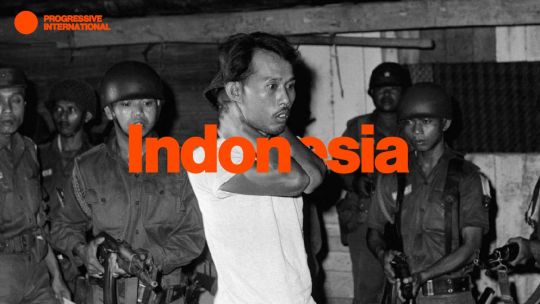
In the dark years that followed, the dictatorship massacred over a million Indonesian communists, with the CIA and US diplomats drawing up “kill lists” for the Indonesian military. The operation would become a template for the US’s regime change operations for decades to come.
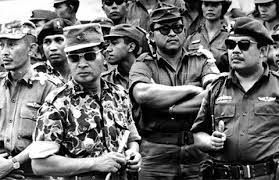
Major-General Suharto with Indonesian Army in 1966
In 1945, President Sukarno led Indonesia to independence from Dutch colonial rule. He championed the Non-Aligned Movement and hosted the historic Bandung Conference, a meeting of Afro-Asian states, in 1955.
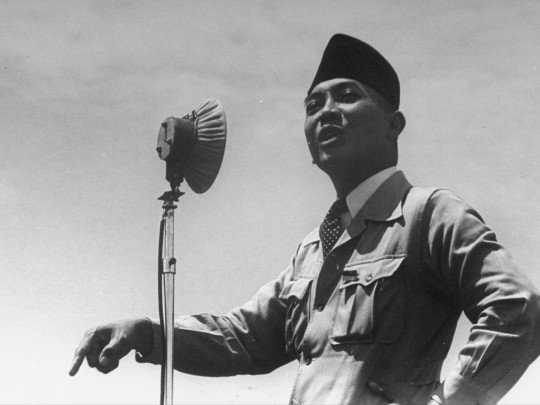
First President of Indonesia Sukarno making a speech circa 1945
Opening the conference and forecasting what was to come, Sukarno said: “We are often told ‘Colonialism is dead’. Let us not be deceived or even soothed by that… Colonialism also has its modern dress, in the form of economic control, intellectual control, actual physical control by a small, but alien community within a nation.”
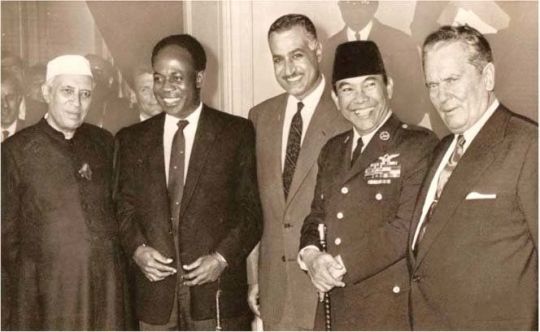
Leaders attending the Bandung Conference 1955 in Bandung, Indonesia. From left: Indian Prime Minister Jawaharlal Nehru, Ghanian Prime Minister Kwame Nkrumah, Egyptian Prime Minister Gamal Abdel Nasser, President Sukarno, and Yugoslavian Prime Minister Josip Broz Tito.
By 1965, Indonesia possessed one of the world's largest communist parties, the PKI. The PKI had a mass membership and mobilized vast numbers of people in the battle against Indonesia’s ruling class.
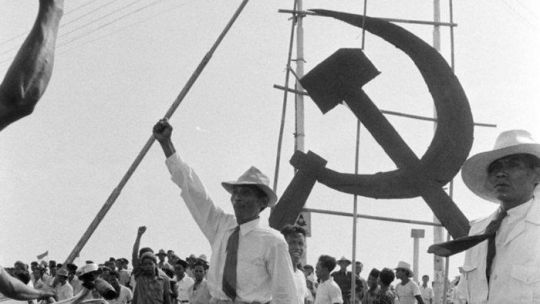
Campaign of the Indonesian Communist Party (PKI) in September 1955.
Terrified by the strength and organization of Indonesia’s people, the Indonesian military’s 30th September Movement began to purge the PKI.
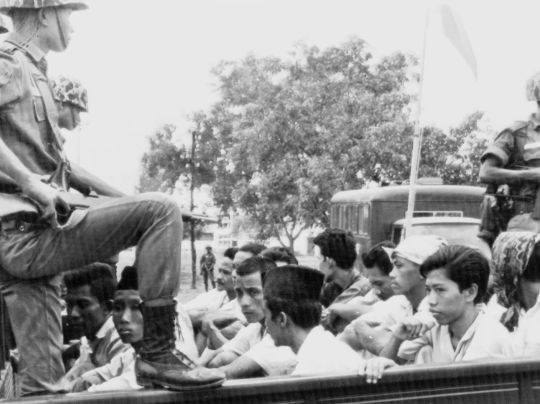
Men suspected of being IPK members being transported under guard by an armed Indonesian soldier
In the early hours of 1 October, a group of military conscripts murdered six high-ranking generals. Blaming the deaths on the PKI, Suharto used the attacks as a pretext to seize power. CIA communications equipment allowed him to spread false reports around the country and begin a long campaign of anti-communist propaganda.
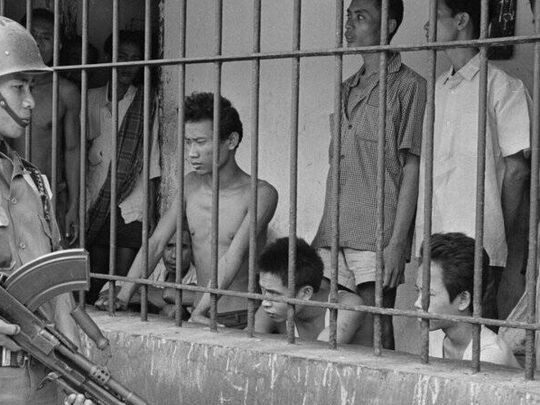
The US had tried to overthrow Sukarno for years; in 1958, the CIA backed armed regional rebellions against the central government. In 1965, they did all they could to aid Suharto’s murderous power grab.
The campaign soon became genocidal. On islands like Bali, up to 10% of the population was massacred — and luxury hotels soon began to appear over the killing fields.
One US embassy staffer told the US press that Suharto’s military “probably killed a lot of people, and I probably have a lot of blood on my hands, but that's not all bad.”
Time Magazine referred to the killings as “the West’s best news for years in Asia”.
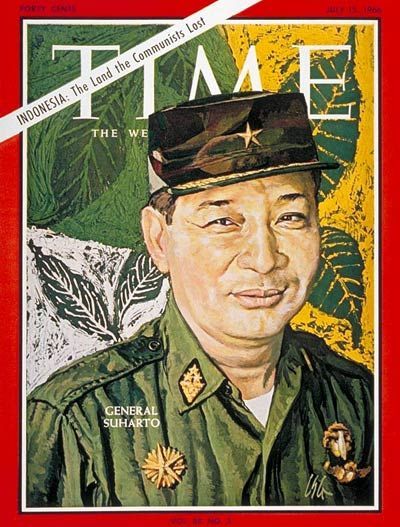
A cable from the US embassy’s first secretary, Mary Vance Trent, to the State Department referred to events in Indonesia as a “fantastic switch which has occurred over 10 short weeks”. It also included an estimate that 100,000 people had been slaughtered.
Cementing his power, Suharto became president in 1967. His ‘New Order’ policy allowed Western capitalism to exploit Indonesia’s cheap labour and plunder its natural resources. Civil rights and dissent were suppressed.
In one of the world’s most populous countries, any possibility for the emergence of a new, democratic political project was eliminated. Richard Nixon described Indonesia as “the greatest prize in Southeast Asia”. Suharto would not leave office until 1998.
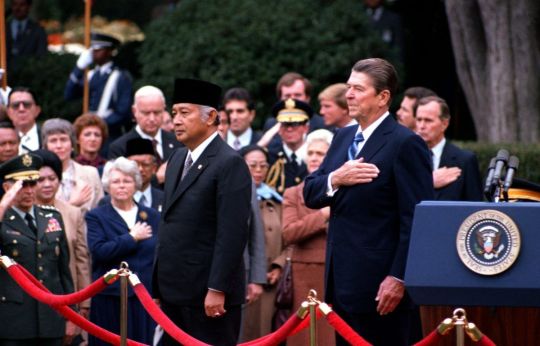
U.S. President Ronald Reagan stands with Indonesian President Suharto in the White House South Lawn at the arrival ceremony for Suharto's State Visit. Oct 12, 1982
CIA officers described Suharto’s rise to power and anti-communist purge as the “model operation” and “Jakarta” soon became the codeword for anti-communist extermination programs in Latin America, where hundreds of thousands were massacred in regime change efforts engineered by Washington.
#cold war#us imperialism#american imperialism#western imperialism#indonesia#indonesian history#politicide#indonesian genocide#cia#world history#general suharto#president sukarno#anti imperialism#communist history#decolonization#colonialism#southeast asia#1965 genocide#30 September Movement#balinese genocide#bali#indonesian killing fields#progressive international#knee of huss
71 notes
·
View notes
Text
Leon S. Kennedy - Character Analysis
I know that the whole training to become a government agent for the DSO via blackmail was horrendous. Nightmarish. Abusive.
But can I add that Leon being an attractive, 21 year old probably made it so much worse.
Imagine being Leon S. Kennedy, freshly surviving an apocalypse as your first day on the RCPD. You’ve seen horrors and dealt with things only seen in fiction, you’ve made a friend out of a worried young college student and the daughter of the scientists responsible for the destruction of Racoon City.
You’re taken into an interrogation room, still in your filthy police uniform and the bullet in your shoulder hasn’t been checked yet. You’re given one option. Work with us as a BOW killing machine or we send your friend to jail and experiment on the 12 year old. And if we don’t get the results we want… we may have to dispose of her.
You became a police officer to protect the public, the innocent. So you do just that.
You sign your life away.
Now in training you’re abused mentally, physically, and emotionally. People don’t take you seriously at all. Constantly being looked at with sneers, or unwanted appreciation.
You have to chip away at the last little bit of your innate goodness to survive here. You can no longer be that bright eyed, excited kid that finished top of his class at the police academy. You have to become, you have to be the soldier you slowly invented as the night in Racoon City progressed.
You’re not given any time off to properly rest. You’re the DSO’s top agent; you don’t have a choice.
Mission after mission, it seems never ending. The horrors you’ve faced keep piling up to the point you can’t even remember the good memories; the normal memories you experienced before September 30th, 1998.
People expect you to be perfect. The DSO’s Golden Boy. You can’t even have a small vacation in peace before colleagues bug you. Your FOS Hunnigan, the BSAA, TerraSave.
And people wonder why you’re best friend is the bottom of a bottle. It’s the only friend you actually have (at least in your mind it is)

#resident evil#biohazard#character analysis#leon kennedy#leon s kennedy#angst#my poor boy#he’s so much more than just a pretty face#all he wants is to get dinner after every mission… probably because he’s super lonely and wants to make friends#he truly does need a vacation
42 notes
·
View notes
Text
The 50 Best War Films of All Time

This is a tricky genre to try summarize, because of what each individual will choose to classify as a "war film", but I've done my best and tried to focus for the most part on stories set within the thick of actual warfare, rather than dramas taking place afterwards or behind the scenes, and except for a small number of impossible-to-ignore exceptions, very few comedies. Ranked and rated in loose order of quality, high-to-low:
Apocalypse Now (1979) ★★★★★★★★★★
All Quiet on the Western Front (1930) ★★★★★★★★★½
The Great Escape (1963) ★★★★★★★★★½
Ballad of a Soldier (1959) ★★★★★★★★★☆
Schindler's List (1993) ★★★★★★★★★☆
The Cranes Are Flying (1957) ★★★★★★★★★☆
The Boat (1981) ★★★★★★★★½☆
Saving Private Ryan (1998) ★★★★★★★★½☆
Catch-22 (1970) ★★★★★★★★½☆
The Last Bridge (1954) ★★★★★★★★½☆
The Deer Hunter (1978) ★★★★★★★★½☆
The Thin Red Line (1998) ★★★★★★★★½☆
The Killing Fields (1984) ★★★★★★★★½☆
Ice Cold in Alex (1958) ★★★★★★★★½☆
Lawrence of Arabia (1962) ★★★★★★★★½☆
The Bridge on the River Kwai (1957) ★★★★★★★★½☆
Wings (1927) ★★★★★★★★½☆
The Grand Illusion (1937) ★★★★★★★★½☆
Enemy at the Gates (2001) ★★★★★★★★☆☆
Three Kings (1999) ★★★★★★★★☆☆
Good Morning, Vietnam (1987) ★★★★★★★★☆☆
The Big Parade (1925) ★★★★★★★★☆☆
The Destiny of a Man (1959) ★★★★★★★★☆☆
The Bridge (1959) ★★★★★★★★☆☆
Army of Shadows (1969) ★★★★★★★★☆☆
Dr. Strangelove (1964) ★★★★★★★★☆☆
Full Metal Jacket (1987) ★★★★★★★★☆☆
The Burmese Harp (1956) ★★★★★★★★☆☆
Five Graves to Cairo (1943) ★★★★★★★★☆☆
Patton (1970) ★★★★★★★★☆☆
Napoleon (1927) ★★★★★★★★☆☆
The Wooden Horse (1950) ★★★★★★★★☆☆
Zulu (1964) ★★★★★★★½☆☆
Birdy (1984) ★★★★★★★½☆☆
1917 (2019) ★★★★★★★½☆☆
The Tin Drum (1979) ★★★★★★★½☆☆
Valkyrie (2008) ★★★★★★★½☆☆
The Human Condition I: No Greater Love (1959) ★★★★★★★½☆☆
The Human Condition III: A Soldier's Prayer (1961) ★★★★★★★½☆☆
M*A*S*H* (1970) ★★★★★★★½☆☆
Land of Mine (2015) ★★★★★★★½☆☆
The Hurt Locker (2008) ★★★★★★★☆☆☆
Gallipoli (1981) ★★★★★★★☆☆☆
Empire of the Sun (1987) ★★★★★★★☆☆☆
'71 (2014) ★★★★★★★☆☆☆
Born on the Fourth of July (1989) ★★★★★★★☆☆☆
Paths of Glory (1957) ★★★★★★★☆☆☆
Breaker Morant (1980) ★★★★★★★☆☆☆
Inglourious Basterds (2009) ★★★★★★★☆☆☆
Platoon (1986) ★★★★★★★☆☆☆

42 notes
·
View notes
Text

Small Soldiers (1998)
94 notes
·
View notes
Text
Modern Warfare/ Shadow Company OC: Irina Makarova

General Information:
Name: Irina Makarova (Ирина Макарова)
Code name: Nomad
Alias(es): Natalya Ivanova, Vampira (by Valeria), Vamp (by Graves)
Nationality: Russian
Place of Birth: Moscow, RSFSR, Soviet Union
Birthday: May 22, 1986 (aged 38)
Gender: Female
Sexual Orientation: Lesbian
Affiliations: Russian Ground Forces (formerly), Gruzdev Bratva (formerly), Shadow Company (currently)
Eyes: Brown/Blue
Hair: Blonde (was naturally black)
Build: Lean athletic
Height: 5’6
Languages: Russian, English, Spanish, German, and Mandarin Chinese.
Relationships: Valeria Garza (one night stand)
Marks: Scar on neck
_______________________________________________________
Biography:
Irina was born just before the fall of the Soviet Union in the suburbs of Moscow, alongside her older brother, Vladimir Makarov. As the daughter of a high-ranking politician within the Russian government, Irina watched the Soviet Union crumble, taking her father with it at the age of 4. After her father’s death, Irina grew up with a brother who didn't consider her a sister, but rather a mistake who would often blame her for their father’s death and the failures of the Soviet Union. Irina cut ties with her brother when he enlisted in the Russian military in 1998. Irina would later enlist in 2004.
During her service, Irina was an extraordinary soldier with her fast reflexes and marksmanship skills as she quickly moved up the ranks.
After six years of service, Irina was discharged from the military and soon befriended a former soldier. Impressed with her combat skills, Irina was recruited into the Gruzdev Bratva as an enforcer. Over the years, Irina found a sense of belonging in the bratva, her ruthless methods and loyalty moved her up in the hierarchy.
Sometime in 2021, two members of the crime family broke into Irina’s home one night in an attempt to assassinate her, which resulted in two casualties and an almost slit throat. Discovering Makarov’s involvement in the assassination, she knew from then on that his torment was just beginning. After the failed assassination attempt by Konni, Irina fled the country altered her appearance changed her identity, and traveled to various locations in Europe and Asia.
In early 2022, Irina resided in Las Almas, Mexico, where she would meet Valeria Garza at a small cafe, unaware of the work she does. The two would occasionally meet at the same spot almost every afternoon, which brought them closer together. After the chaos happening in Las Almas between Task Force 141 and Shadow Company, Irina left Mexico and vanished.
Several months later, Irina met Phillip Graves at a bar during one of her travels. Going over her dossier and being impressed by her military service history, as well as having the same hatred for Konni, Graves recruited her to Shadow Company.
______________________________________________________
Headcanons:
To celebrate one month of friendship, Valeria once gifted Irina a fruit bat.
Best friends with Velikan. Irina reminds him of an old friend she used to have during her bratva days. The two would often share stories about their pasts and often train together.
Her favorite comfort food is Blini (Russian pancake) because of how versatile they are. She loves to put some blueberry jam for when craving something sweet or smoked salmon with caviar for something savory.
#graves 🤝 irina#hatred for konni#Call of Duty#Modern Warfare#Irina Nomad Makarova#call of duty modern warfare#call of duty oc#cod oc#shadow company#shadow company oc
17 notes
·
View notes
Text





Small Soldiers (1998) directed by Joe Dante.
#Small Soldiers (1998)#Small Soldiers#90's#90s#1998#my gif#gifs#my edit#gif#American action comedy film#dolls#doll#Gwendy Doll
47 notes
·
View notes
Note
Of the two, who is more likely to be legit spooked by unexplained weird shit? Clint or Natasha?
Ohh good one. Now I get to expose you to my more weird headcanons!! (That may or may not be inspired by real events.)
Clint’s a firm believer in aliens and UFOS. He saw one in the summer of 1998 on base out west. He was driving home with his unit after a night of drinking off base and the truck he was driving just stopped. RIGHT THERE!! In the middle of the road! Like completely shut off, no headlights, nothing. It was like someone detonated a small EMP above his beat up truck. Of course his buddies thought he was fucking with them. Their laughter however quickly turned into frantic yelling when the engine wouldn’t turn over. (“Fucking Barton! If we get our asses caught again I’m going to personally shoot your ass!” “I’m fucking trying Ramirez!”)
And then!
A ball of light slowly descended in front of the windshield, completely silent. No one breathed. And then just as fast as it appeared the mysterious light disappeared, zipping vertically and disappearing into the black night sky!
Clint still talks about it to this day! He swears on his life that he saw a UFO that day. Natasha however thinks he was just drunk of his ass, which he was. BUT STILL HE SAW IT!
(Clint gets vindicated though after Loki, Thor and the other galatic hullabaloo that happens later.)
Natasha’s pretty straightforward. She’s the seeing is believing kind. Her experience with the weird and unexplained shit was always rooted in something scientific, her brainwashing (at least for my iteration of it for my fic), the super soldier serum, and Tony Stark’s eventual tech all have an air of plausibility to them.
This worldview however is completely shattered when she fights Clint while he is under Loki’s influence. It scares her to the core, simply because she couldn’t explain it. (It had happened so fast! And by a rock? No days months and years of conditioning?!)
It’s after Loki that she starts to believe Clint when he said he saw a UFO in 1998.
Both of them get a bit shaken up by the unexplained. Natasha I think more so than Clint because of her overly analytical mind.
That was such a fun ask! Thank you dear! I might definitely have to write a cute little one shot about Clint’s UFO experience. It’s partly based on my own mom’s story. (She was out west in Arizona and had one chase her in her car! I haven’t ever seen one tho!)
Oh! Your cookie?! I hope you like generic Chocolate chip! 🍪🍪
#ask me#clint barton#hawkeye#clintasha#natasha romanoff#black widow#personal#fandom#Clint has Roswell memorbillia#Nat reads scientific papers for fun sometimes#she likes psychology
12 notes
·
View notes
Text
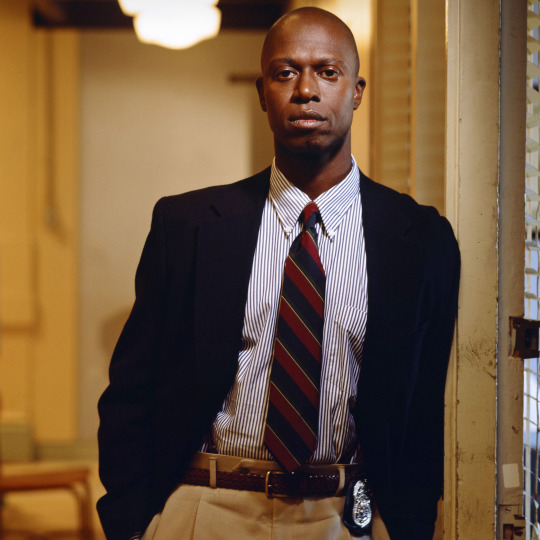
The career of the actor Andre Braugher, who has died of lung cancer aged 61, was benchmarked by two performances in police dramas a generation apart. In the groundbreaking drama Homicide: Life on the Street, from 1993 until 1999, he played Detective Frank Pembleton, whose drive immediately made him the anchor of an impressive ensemble cast led by Yaphet Kotto and Ned Beatty. He drew a younger audience with the comedy Brooklyn Nine-Nine (2013-21) as Captain Ray Holt, who takes over a chaotic homicide squad and whose intensity again makes him the heart of the show.
Braugher’s deep, resonant voice and seemingly effortless control drew the respect of all he worked with. David Simon, creator of Homicide and The Wire, said: “I’ve worked with a lot of wonderful actors. I’ll never work with one better.” His classical training, at the Juilliard School in New York, made him a regular at the Public Theater’s Shakespeare in the Park, and indeed his portrayal of Henry V in 1996 won him an Obie (the off-Broadway equivalent of the Tony awards).
He brought the projection of the stage to the small screen. Pembleton was the master of “the Box”, or the interrogation room. He explained to his rookie partner in Homicide (played by Kyle Secor), it was “salesmanship … as silver tongued and thieving as ever moved used cars, Florida swamp land or Bibles. But what I am selling is a long prison sentence.” He dominated those small scenes, but the episode Subway, with Vincent D’Onofrio as a character pushed between subway trains, who will die once the trains are separated, was a two-hander whose intensity might have come from the stage of Beckett, Pinter or Mamet.
In Brooklyn Nine-Nine, as Holt, he played it straight in two senses. The adage of comedy being funniest when played straight gained resonance from Braugher’s ability to show the audience with a gesture or line-reading that he, like you, got the joke. But Holt is also gay. His gayness is never an issue, except as motivation for his progress within the police. It was as if Pembleton were stepping into Kotto’s “Gee” Giardello, a black man with an Italian father who was determined to rise in a white-dominated department.
This drive reflected Braugher’s own background. In the tough neighbourhood of Austin, on Chicago’s West Side, both his parents worked for the government; his father, Floyd, was a heavy equipment operator for the state of Illinois, and his mother, Sally, worked for the US Postal Service. He recalled he might have “pretended I was hard and tough and not square”, but he won scholarships to the Jesuit St Ignatius College prep and then to study mathematics at Stanford University, California. After walking into a student production of Hamlet, and playing Claudius, he decided he wanted to act.
Another scholarship took him to Juilliard. He graduated in 1988 and almost immediately was cast in a TV revival of Kojak, as his assistant. His first film role came in Glory (1989); he was so impressive as the educated Thomas Searles, forced to serve as a private soldier in the all-black regiment commanded by his white friend, that Hollywood came calling, but the parts were standard stereotyical roles. His father had questioned how a black actor would make a living, and Braugher later explained: “I’d rather not work than do a part I’m ashamed of.”
He played the lead in a TV movie, The Court-Martial of Jackie Robinson (1990), playing Robinson, the first African-American player in major league baseball, who earlier in the 1940s, as a US army lieutenant, had refused to ride in the back of a segregated bus; and appeared in another TV film, The Tuskegee Airmen (1995). He was an egotistical actor in Spike Lee’s Get On the Bus (1996), about the Million Man March on Washington DC the year before. In 1998 he won his first Emmy award for playing Pembleton; he was nominated 11 times, and won his second in 2006 for his role in the miniseries Thief.
After Homicide, he starred as a doctor in Gideon’s Crossing (2000-01), as a cop in Hack (2002-04), as a car dealer in the comedy-drama Men of a Certain Age (2009-11) and as the captain of a submarine which goes on the run after he refuses to obey orders to fire nuclear missiles in Last Resort (2012-13). He had another series of remarkable two-handers in a recurring role as Hugh Laurie’s psychiatrist in House, was a defense attorney in episodes of Law and Order: Special Victims Unit, and voiced Governor Woodchuck Coodchuck-Berkowitz in the animated comedy BoJack Horseman.
He made the most of supporting roles in films such as Primal Fear (as Richard Gere’s investigator), Poseidon (captain of the sinking liner), Salt (as the US secretary of defense) and most notably as a New York Times editor in She Said (2022), covering the Harvey Weinstein scandal. He also starred in 10,000 Black Men Named George (2002), the story of the unionisation of Pullman railway porters, who were always called “George” by passengers.
Braugher admitted that his career “could have been larger, but it would have been at the expense of my own life”. He lived in suburban New Jersey with his wife, the actor Ami Brabson (who played Pembleton’s wife in Homicide). He said he wanted his three sons, Michael, Isaiah and John Wesley, raised in a “true context”, away from being a movie star’s offspring in Hollywood.
He is survived by his wife and sons, his brother, Charles, and his mother.
🔔 Andre Keith Braugher, actor, born 1 July 1962; died 11 December 2023
Daily inspiration. Discover more photos at Just for Books…?
15 notes
·
View notes
Text
Helena Rorke
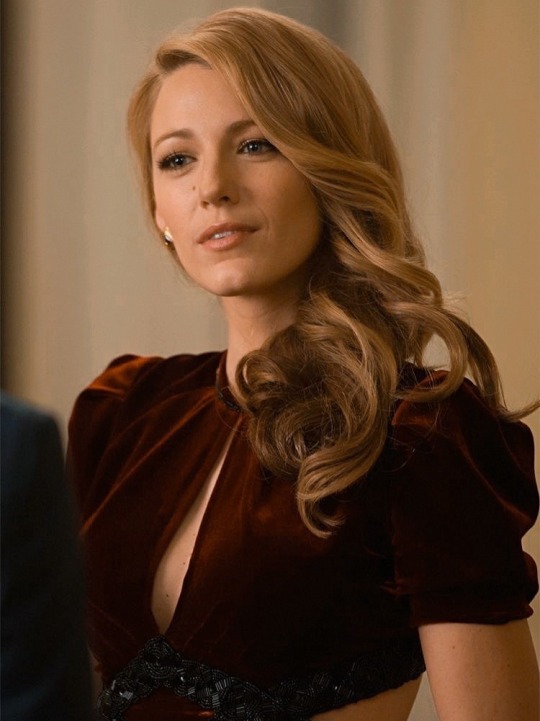
Full Name: Helena Annabelle Rorke
Date of Birth: August 19th, 1976. Milwaukee, Wisconsin.
Date of Death: May 4th, 2011. Unknown location, South America
Nationality: American
Occupation: United States Air Force / Task Force STALKER
Rank: First Lieutenant
Age: 35 years old (At time of death)
Family / Relatives:
-Samuel Rorke - Father (Deceased)
-Marie Henrikson - Mother (Deceased)
-Gabriel Rorke - Older brother (Alive)
-Henry Ashford - Husband (Alive)
-Elizabeth and Evangeline Ashford - Daughters (Alive)
-Elias Walker II - Grandson (Alive)
Appearance:
*Hair color: Blonde
*Eye color: Blue
*Height: 5'3 / 160 cm
*Scars / Beauty marks / Blemishes: Helena's nose is slightly crooked due to an injury that never healed properly; a small gap in her front teeth
*Faceclaim: Blake Lively
Personality:
On a personal level, Helena is a lighthearted and jokester, as a way to keep spirits and morale up in tough times. Although she can be quite stubborn and rather prideful about her skills (a quality Beth would inherit from her), she seldom ever brags unless she has a reason to, and is content to simply just do her job.
On a professional level, Helena is every bit stoic and harsh, completely locking in whenever the situation calls for it. She prioritizes completing the mission, while minimizing casualties as much as she can.
Due to this aspect of her, Helena was nicknamed "Helly" as a silly little play-on version of the shortened word "heli" from helicopter, although this was an endearing nickname from Henry.
Background:
Helena was born on August 19th, 1976, in Milwaukee, Wisconsin to Samuel Rorke and Marie Henrikson; she was their second child, two years after their son Gabriel. Marie worked as a schoolteacher, while Samuel was a retired Army veteran.
Helena and Gabriel's childhood was not glamorous; the family struggled financially, and Samuel, having fought in the Vietnam War some years earlier, was a raging alcoholic who frequently abused his wife and children, with Marie doing everything she could to shield her children from his violence. When Helena was ten years old, Marie was diagnosed with a terminal illness, and died within a few months of receiving the news. This led to the two siblings to have take odd jobs in their teenage years in order to support themselves and get by, as Samuel continued to drink and gamble away their money.
At the age of 18, Gabriel would eventually leave the house and enlist in the Marine Corps straight out of high school. Two years later, Helena would follow after him, although she signed onto the Air Force.
Helena would eventually meet a friend of Gabriel and Elias's, Henry Ashford. The two gradually formed a bond over time and fell in love; they got married in 1998, and a year later, they had twin girls, Elizabeth and Evangeline, in 1999.
In 2005, Helena would participate in Operation: Sand Viper in the ongoing Tel Aviv War. Due to her skills in managing aircraft, she assisted in saving lives by airlifting wounded soldiers and civilians out of the hospital. When all came to a standstill, this would mark the formation of the Ghosts, and due to her role, Helena would be the designated pilot of the task force, something she carried with pride.
In 2011, sometime after the formation of the Federation, while pursuing high ranking officials, Helena and a small squadron were ambushed, their helicopter being shot out of the sky and crashing in the Amazon Rainforest. The crash was fatal, and all those in the helicopter perished on impact. Helena's body would never be recovered, nor given a proper burial of a Ghost.
With her passing left her family and comrades in devastation. Henry would never remarry and remained a widower, and shifted his focus to raising their daughters. Her death would haunt the small family in the years to come, with Beth and Eva enlisting after the ODIN strikes to honor their mother's memory.
6 notes
·
View notes
